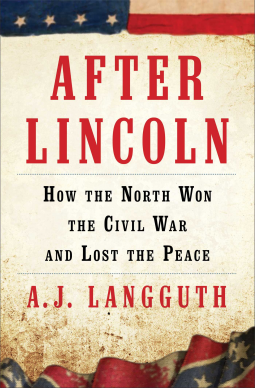
After Lincoln
How the North Won the Civil War and Lost the Peace
by A. J. Langguth
This title was previously available on NetGalley and is now archived.
Buy on Amazon
Buy on BN.com
Buy on Bookshop.org
*This page contains affiliate links, so we may earn a small commission when you make a purchase through links on our site at no additional cost to you.
Send NetGalley books directly to your Kindle or Kindle app
1
To read on a Kindle or Kindle app, please add kindle@netgalley.com as an approved email address to receive files in your Amazon account. Click here for step-by-step instructions.
2
Also find your Kindle email address within your Amazon account, and enter it here.
Pub Date Sep 16 2014 | Archive Date Oct 14 2014
Description
A brilliant evocation of the post-Civil War era by the acclaimed author of Patriots and Union 1812. After Lincoln tells the story of the Reconstruction, which set back black Americans and isolated the South for a century.
With Lincoln’s assassination, his “team of rivals,” in Doris Kearns Goodwin’s phrase, was left adrift. President Andrew Johnson, a former slave owner from Tennessee, was challenged by Northern Congressmen, Radical Republicans led by Thaddeus Stephens and Charles Sumner, who wanted to punish the defeated South. When Johnson’s policies placated the rebels at the expense of the black freed men, radicals in the House impeached him for trying to fire Secretary of War Edwin Stanton. Johnson was saved from removal by one vote in the Senate trial, presided over by Salmon Chase. Even William Seward, Lincoln’s closest ally in his cabinet, seemed to waver.
By the 1868 election, united Republicans nominated Ulysses Grant, Lincoln's winning Union general. The night of his victory, Grant lamented to his wife, “I’m afraid I’m elected.” His attempts to reconcile Southerners with the Union and to quash the rising Ku Klux Klan were undercut by post-war greed and corruption during his two terms.
Reconstruction died unofficially in 1887 when Republican Rutherford Hayes joined with the Democrats in a deal that removed the last federal troops from South Carolina and Louisiana. In 1964, President Lyndon Johnson signed a bill with protections first proposed in 1872 by the Radical Senator from Massachusetts, Charles Sumner.
With Lincoln’s assassination, his “team of rivals,” in Doris Kearns Goodwin’s phrase, was left adrift. President Andrew Johnson, a former slave owner from Tennessee, was challenged by Northern Congressmen, Radical Republicans led by Thaddeus Stephens and Charles Sumner, who wanted to punish the defeated South. When Johnson’s policies placated the rebels at the expense of the black freed men, radicals in the House impeached him for trying to fire Secretary of War Edwin Stanton. Johnson was saved from removal by one vote in the Senate trial, presided over by Salmon Chase. Even William Seward, Lincoln’s closest ally in his cabinet, seemed to waver.
By the 1868 election, united Republicans nominated Ulysses Grant, Lincoln's winning Union general. The night of his victory, Grant lamented to his wife, “I’m afraid I’m elected.” His attempts to reconcile Southerners with the Union and to quash the rising Ku Klux Klan were undercut by post-war greed and corruption during his two terms.
Reconstruction died unofficially in 1887 when Republican Rutherford Hayes joined with the Democrats in a deal that removed the last federal troops from South Carolina and Louisiana. In 1964, President Lyndon Johnson signed a bill with protections first proposed in 1872 by the Radical Senator from Massachusetts, Charles Sumner.
Available Editions
| EDITION | Hardcover |
| ISBN | 9781451617320 |
| PRICE | $28.00 (USD) |



